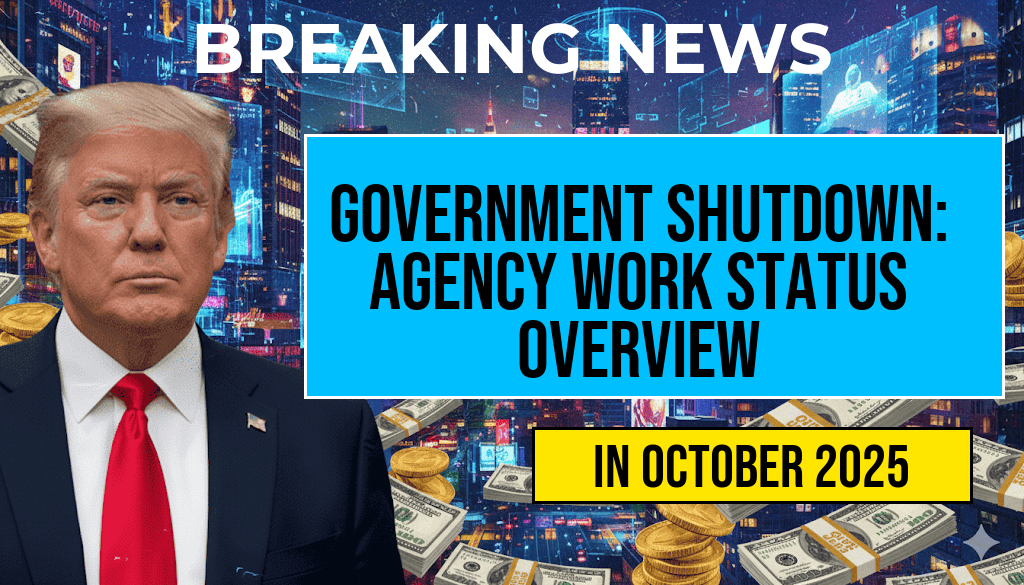The ongoing government shutdown has prompted significant disruptions across various federal agencies, affecting millions of Americans. As lawmakers continue to debate funding issues, the implications of the shutdown are becoming increasingly evident. Essential services like Social Security and the Internal Revenue Service (IRS) are operating under limited capacity, while defense and transportation sectors are also facing challenges. This comprehensive overview outlines which agencies are still functioning and how services may be impacted, providing clarity during this uncertain period.
Current Status of Key Federal Agencies
| Agency | Status | Details |
|---|---|---|
| Social Security Administration | Operational | Payments will continue, but new applications may be delayed. |
| Internal Revenue Service (IRS) | Partially Operational | Tax processing will be slowed; refunds may take longer. |
| Department of Defense | Operational | Military personnel remain active, but civilian employees face furloughs. |
| Transportation Security Administration (TSA) | Operational | Screening operations continue, but staffing levels may be affected. |
| Department of Education | Partially Operational | Federal student aid processing will continue, but other functions may slow. |
| Environmental Protection Agency (EPA) | Limited Operations | Most regulatory functions are suspended; essential services continue. |
Impact on Social Services
The Social Security Administration remains operational, ensuring that monthly benefit payments continue for retirees and disabled individuals. However, new applications for benefits may experience delays as resources are reallocated to maintain ongoing payments. This situation adds to the ongoing stress for those relying on these crucial funds.
With the IRS, the shutdown complicates tax processing. While tax payments and refund processing will continue, delays are anticipated, potentially affecting millions of taxpayers expecting refunds. The agency has urged taxpayers to file electronically to minimize processing times.
Defense and National Security
The Department of Defense continues its critical operations without interruption. Active-duty military personnel will not be affected by the shutdown; however, many civilian employees are facing furloughs. This not only impacts their financial stability but also affects the overall efficiency of military operations.
Transportation and Safety
The Transportation Security Administration (TSA) is functioning, with airport security screenings ongoing. However, staffing levels may dip as part-time and seasonal employees face uncertainty. Travelers are advised to arrive early at airports to account for potential delays during the screening process.
Education and Environmental Oversight
The Department of Education is experiencing limited operations. While federal student aid continues to be processed, other educational initiatives and grant programs may see disruptions. This could impact schools and students relying on federal funding.
In the case of the Environmental Protection Agency (EPA), most regulatory functions are suspended, impacting environmental assessments and regulatory enforcement. Essential services may continue, but the agency’s ability to respond to environmental emergencies may be compromised.
Conclusion: Navigating the Uncertainty
As the government shutdown continues, the impact is felt across various sectors, with essential services operating at limited capacity. Citizens are encouraged to stay informed about changes affecting their services. For ongoing updates, reliable sources include the Forbes and Wikipedia. The landscape remains dynamic as negotiations progress, and further developments are expected in the coming days.
Frequently Asked Questions
What is a government shutdown?
A government shutdown occurs when Congress fails to pass legislation to fund government operations, leading to the temporary closure of federal agencies and services.
Which agencies are affected by the government shutdown?
The government shutdown impacts various federal agencies, including the IRS, Social Security, Department of Defense, and TSA, with some continuing operations and others shutting down completely.
Will Social Security payments continue during a shutdown?
Yes, during a government shutdown, Social Security payments typically continue as they are funded through mandatory spending rather than discretionary appropriations.
How does a government shutdown affect the IRS?
During a government shutdown, the IRS may halt certain services, including processing tax returns and issuing refunds, although some essential functions may still operate.
Are airport security services affected by the shutdown?
The TSA generally continues to operate during a government shutdown, but staffing levels may be impacted, potentially leading to longer wait times at airport security checkpoints.











